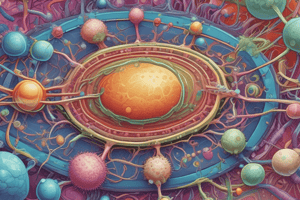Podcast
Questions and Answers
ما الخاصية التي تميز الخلايا البروكاريوتية عن الخلايا اليوكاريوتية؟
ما الخاصية التي تميز الخلايا البروكاريوتية عن الخلايا اليوكاريوتية؟
- النمو بسرعة عالية بفضل آليات تكرير بسيطة
- الهيكل البسيط مع التنظيم الداخلي الحد الأدنى
- الانقسام من خلال الانقسام الثنائي بدلاً من الميتوز
- الوجود الحر للصبغية الدائرية الواحدة في السيتوبلازم (correct)
ما هو آلية التكاثر التي تحدث في الخلايا البروكاريوتية؟
ما هو آلية التكاثر التي تحدث في الخلايا البروكاريوتية؟
- الانقسام الثنائي (correct)
- الانقسام المحلل
- الانقسام الميتوزي
- التكاثر الجنسي
ما الذي يساهم في سرعة تكاثر الخلايا البروكاريوتية؟
ما الذي يساهم في سرعة تكاثر الخلايا البروكاريوتية؟
- الانقسام المحلل
- الأنقسام الميتوزي
- الهيكل المعقد
- الآليات البسيطة للتكرير (correct)
ما هو حجم الخلايا البروكاريوتية مقارنة بالخلايا اليوكاريوتية؟
ما هو حجم الخلايا البروكاريوتية مقارنة بالخلايا اليوكاريوتية؟
ما هو نوع كروموسومات الخلاية البروكاريوتية؟
ما هو نوع كروموسومات الخلاية البروكاريوتية؟
ما هو الفارق الرئيسي بين الكائنات الحية البروكاريوتية واليوكاريوتية؟
ما هو الفارق الرئيسي بين الكائنات الحية البروكاريوتية واليوكاريوتية؟
ما هي البنية المحيطة بالحمض النووي لدى الخلايا البروكاريوتية؟
ما هي البنية المحيطة بالحمض النووي لدى الخلايا البروكاريوتية؟
ما هي وظيفة الريبوزومات في الخلايا البروكاريوتية؟
ما هي وظيفة الريبوزومات في الخلايا البروكاريوتية؟
ما هي الميزة التي تفتقدها الخلايا البروكاريوتية مقارنة بالخلايا اليوكاريوتية؟
ما هي الميزة التي تفتقدها الخلايا البروكاريوتية مقارنة بالخلايا اليوكاريوتية؟
ما هي وظيفة هياكل مثل السباع والأليلات في الخلايا البروكاريوتية؟
ما هي وظيفة هياكل مثل السباع والأليلات في الخلايا البروكاريوتية؟
لماذا يُعرف بعض أنواع الخلايا البروكاريوتية بـ 'البكتيريا'؟
لماذا يُعرف بعض أنواع الخلايا البروكاريوتية بـ 'البكتيريا'؟
Study Notes
Exploring Cellular Diversity: Prokaryotes vs. Eukaryotes
At the heart of life's intricate tapestry lie two fundamental cell types: prokaryotes and eukaryotes. These entities serve as our starting point when we delve into the fascinating world of cell biology. In this exploration, let's dive deeper into the realm of prokaryotic cells.
What Are Prokaryotic Cells?
Prokaryotic organisms, often referred to simply as 'proto', were among the first living beings to emerge on Earth over three billion years ago. They lack several structures present in more advanced eukaryotes. At their core, prokaryotes consist of a single circular DNA molecule encased within a membrane called a plasma membrane. Their nucleus is absent, yet they have specialized compartments known as organelles. These organelles include ribosomes – where protein synthesis occurs – and other structures such as the flagellum and pili (used for motility).
Unlike eukaryotes, which measure micrometers in size, some prokaryotic species like bacteria can even reach nanometers (nanobacteria). This minute scale allows them to thrive in various environments, from extreme habitats like hot springs and hydrothermal vents to niches deep below the earth's surface. This adaptability has permitted prokaryotes to colonize almost every imaginable habitat on Earth, contributing significantly to global ecosystems in diverse roles ranging from decomposers to producers.
Characteristics of Prokaryotic Cells
A few key features distinguish prokaryotes from eukaryotes:
- Simple structure with minimal internal organization; absence of membrane-bound organelles
- Single circular chromosome floating freely in the cytoplasm
- Division through binary fission rather than mitosis; daughter cells do not receive identical copies of parental genetic material
- Reproduction occurs rapidly due to simple replication mechanisms
- Smaller size (approximately 1 micron compared to tens of microns found in many eukaryotes)
In contrast, larger eukaryotic cells contain membrane-enclosed organelles, double linear chromosomes, undergo meiosis during reproduction, produce energy via complex respiration processes, and exhibit greater structural complexity. However, both groups share common characteristics such as a plasma membrane and ability to reproduce asexually.
Conclusion
The study of prokaryotic cells uncovers critical aspects of basic biological principles while also revealing unique survival strategies employed by these tiny but significant creatures. As scientists continue exploring microscopic life forms, the mystery behind the origins and evolution of life remains vividly enrobed in their mesmerizing dance across the vastness of nature.
Studying That Suits You
Use AI to generate personalized quizzes and flashcards to suit your learning preferences.
Description
استكشاف الاختلافات والتشابهات بين البكتيريا (الخلايا غير النووية) والخلايا الحقيقية (الخلايا ذات النواة) يساعد في فهم علم الأحياء الخلوي أكثر. تعرف على خصائص البكتيريا، بنية خلاياهم البسيطة، والأدوار المهمة التي يلعبونها في البيئات المختلفة.




